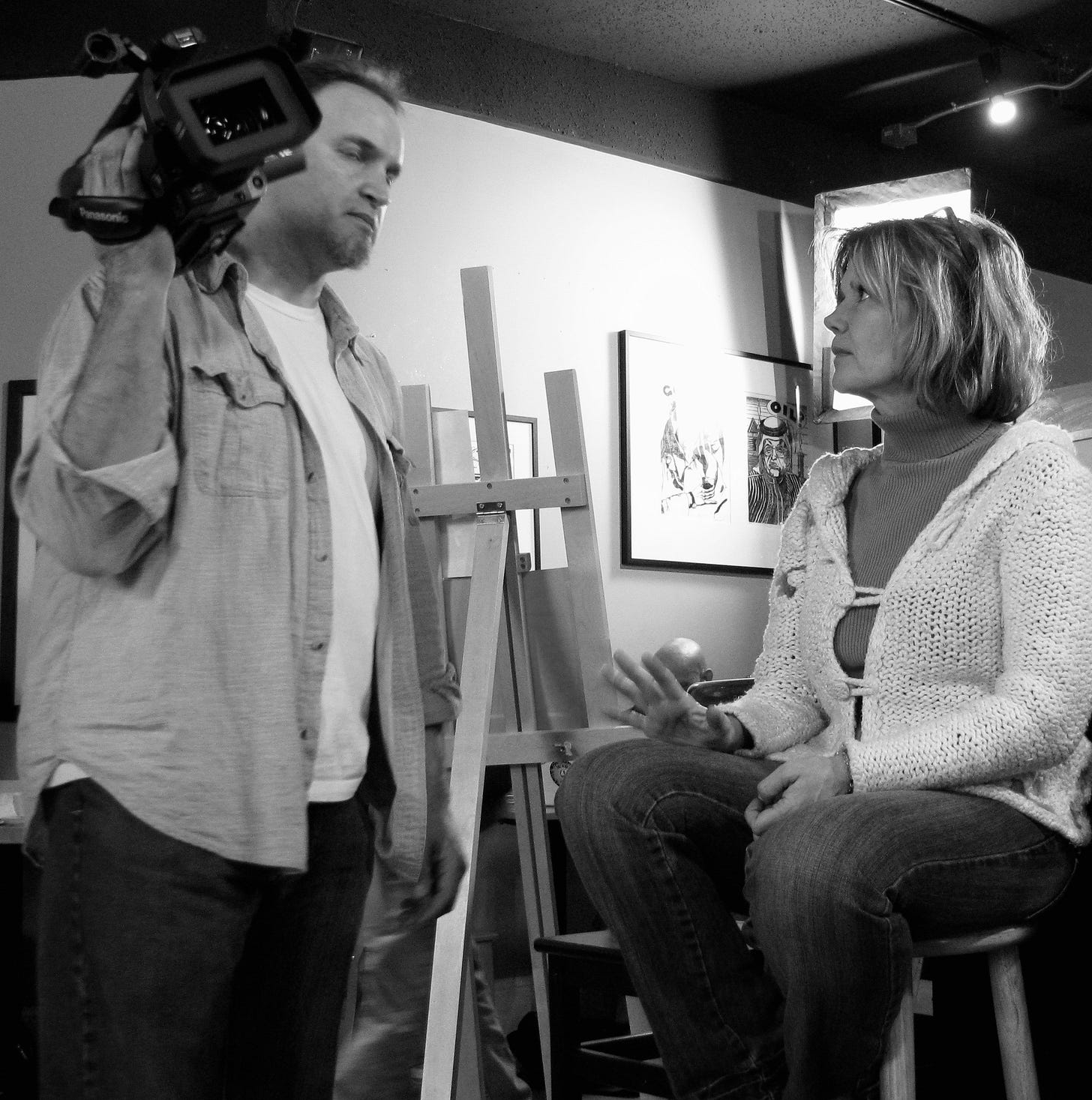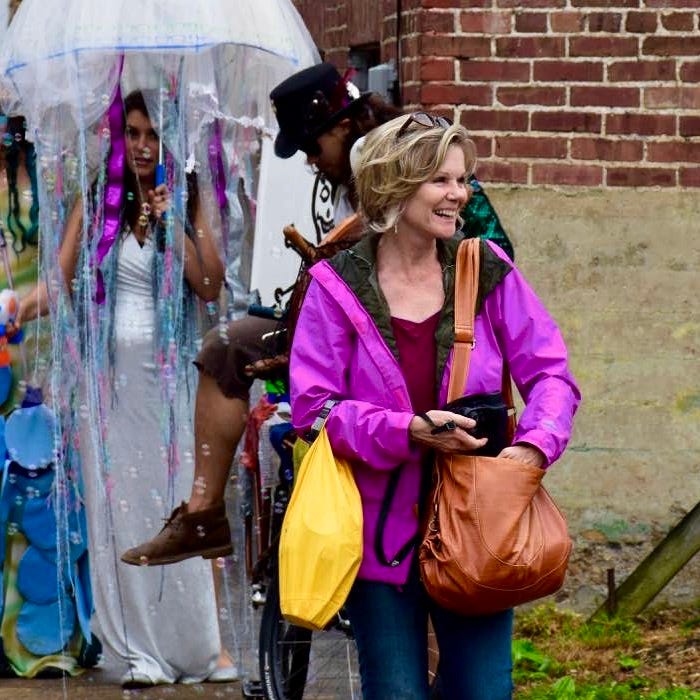A Woman Named Hello was actually my second attempt at a film.
After establishing Asheville Productions as a legal entity, my first thought was to make a documentary about Moni Taylor and her moving b&w photography of the little babies who lived such brief lives.
I called it The Time Between in honor of those precious little time between some babies’ births and their deaths. I hired Leif to edit a trailer with Eva Cassidy’s poignant song, “Songbird” as the underlying music track which, to me, felt like a mother’s ode to her lost child.
Despite many efforts over many months, I was unable to get a grant or pull together production funds. Which was just as well because a few months after the feature I’d written for the Mountain XPress was published, Moni dropped a bombshell on me.
We were having coffee at the Dripolater in downtown Asheville when she told me she had applied and been accepted to serve in the Peace Corps. In the midst of the happy morning buzz of coffee machines, chatter and chill music all around me at the Dripolator, I sat stunned and sad, the coffee in my cup turning cold as she told me all about her new adventure.
She’d been hoping to get stationed in Eastern Europe, she told me. But instead, she’d been assigned to Malawi, a small country in Africa and one of the poorest in the world. Learning that Malawi was nicknamed ‘the warm heart of Africa,’ Moni turned it into an opportunity and embraced the idea of going there instead.
She was so excited, I tried to be happy for her. But I was also heartbroken to hear my first best friend in Asheville would soon be leaving to live and work on other side of the world.
Throughout their childhoods, I tried to nurture in Zoë and Leif the perspective that when disappointments and bad surprises happen, try to turning them around to see how they might be a new opportunity, if seen from a different angle.
Of course, it’s easier to give someone else that advice rather than act upon it yourself. It’s not always obvious and sometimes you have to work hard to wrap your head around unexpected changes. But a few weeks after Moni gave me her news, I thought of a way to look at it as an opportunity.
Pivoting away from The Time Between, I asked Moni if I could instead document her journey from Appalachia to Africa – and she agreed.
The narrative thread would be that it’s one thing to join the Peace Corps in the early post-college years, before the responsibilities of a lifetime and family fall upon you. But what happens when you make a pledge to service at the age of 54, when the childbearing and raising years are behind you? What happens when you leave a life – everything and everyone you have ever known – and find yourself thousands of miles from home, in a culture that bears no resemblance to your own?
I particularly loved the idea that a nurse from Appalachia – an area which for so many decades has been associated with poverty and need – was shifting that old paradigm around by setting forth to help others in the world.
I would document her journey to Africa, I proposed. And along the way, we would discover what would be demanded of her in return after she got there.
Moni said okay and we high-fived our new adventure.
Before going to Africa, Moni decided to get a tattoo. It would be her first and it wouldn’t be just a little flower on her shoulder or a little zen mantra. A devout Catholic, she decided she wanted a full back piece – an image of the Virgin Mary holding a ribbon with the names of her four children in script on it.
“That way the Blessed Mother will always have my back,” she explained, smirking mischievously.
This was a huge commitment in terms of tattoos and pain. I tagged along with her, photographing part of the process for our new documentary adventure, watching her bite strands of her long gray-blonde hair, blinking back tears as Danny the tattoo artist inked the full color images across her backbone.
A few weeks later, I called cinematographer Richard Chisolm and he flew down from Baltimore to help me with two days of shoots around Asheville. Local cameraman Jason Scholder shot a Peace Corps meeting at the Dripolator with Dave Schmidt running sound. To create a fundraising trailer, I licensed footage from Zygimantas Cepaitis to cover the Malawi part and requested permission to use West African musician Baaba Maal’s “A Song for Women.”
Putting the kids to good use, Zoë worked as my associate producer on the shoots and then Leif edited another trailer for me. It still gives me chills – in a good way – to watch it.
At this point, however, nothing had really sprung to mind for the title of the documentary.
And then one day, over yet more cups of tea and coffee, Moni told me she was starting to learn some preliminary words in Chichewa, the primary language spoken in Malawi.
“And hey, how funny is this!?” she said. “My name in Chichewa means ‘hello and welcome.’”
“That’s it!” I said, smiling. “That’s the title of our film – A Woman Named Hello!”
After Moni left for Africa, I busied myself writing and sending out more grant proposals to fund production.
After that, unfortunately, nothing went quite to plan.
For many reasons, Malawi turned out to be an incredibly difficult situation for Moni. Alone, ill and struggling through some dark questioning periods, she eventually decided to become a traveling nurse instead and accepted a posting to Saudi Arabia. I decided to keep following her, knowing that wherever she ended up, it would result in an interesting story. But eventually, when funding grants for this film also failed to materialize, we had no choice but to suspend production a second time.
[You can still see the trailer Leif edited for A Woman Named Hello on my old website: https://kristinfellows.com/site5/portfolio/awomannamedhello.php]
[Photo of me with Jason Scholder on location at the Driopolator by Zoë Alexandra]
Kristin Fellows is a published writer, world traveler, and a well-seasoned documentary film consultant. When not writing, Kristin can often be found listening to someone’s story or behind the lens of one of her cameras.
More about Kristin @ kristinfellowswriter.com






I would love to see this film!
" Hello and Welcome" is a lovely phrase to use every morning and I shall so do shortly when
the sun comes up. Of course the picture I see of the tattoo on her back is the Mexican
Virgin de Guadalupe.